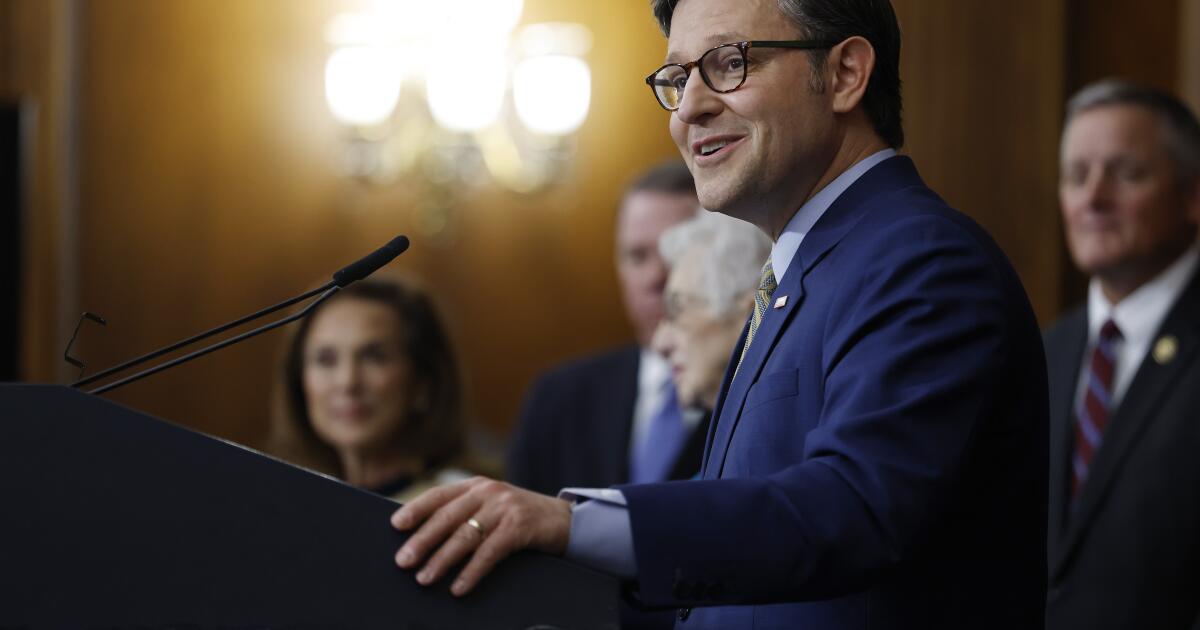Congress has passed Trump’s big bill. Here’s what’s in it
WASHINGTON — Republicans muscled President Trump’s tax and spending cut bill through the House on Thursday, the final step necessary to get the bill to his desk by the GOP’s self-imposed deadline of July 4th.
At nearly 900 pages, the legislation is a sprawling collection of tax breaks, spending cuts and other Republican priorities, including new money for national defense and deportations.
Democrats united against the legislation, but were powerless to stop it as long as Republicans stayed united. The Senate passed the bill, with Vice President JD Vance casting the tiebreaking vote. The House passed an earlier iteration of the bill in May with just one vote to spare. It passed the final version 218-214.
Here’s what’s in the bill:
Tax cuts are the priority
Republicans say the bill is crucial because there would be a massive tax increase after December when tax breaks from Trump’s first term expire. The legislation contains about $4.5 trillion in tax cuts.
The existing tax rates and brackets would become permanent under the bill, solidifying the tax cuts approved in Trump’s first term.
It temporarily would add new tax deductions on tip, overtime and auto loans. There’s also a $6,000 deduction for older adults who earn no more than $75,000 a year, a nod to his pledge to end taxes on Social Security benefits.
It would boost the $2,000 child tax credit to $2,200. Millions of families at lower income levels would not get the full credit.
A cap on state and local deductions, called SALT, would quadruple to $40,000 for five years. It’s a provision important to New York and other high tax states, though the House wanted it to last for 10 years.
There are scores of business-related tax cuts, including allowing businesses to immediately write off 100% of the cost of equipment and research. Proponents say this will boost economic growth.
The wealthiest households would see a $12,000 increase from the legislation, and the bill would cost the poorest people $1,600 a year, mainly due to reductions in Medicaid and food aid, according to the nonpartisan Congressional Budget Office analysis of the House’s version.
Money for deportations, a border wall and the Golden Dome
The bill would provide some $350 billion for Trump’s border and national security agenda, including for the U.S.-Mexico border wall and for 100,000 migrant detention facility beds, as he aims to fulfill his promise of the largest mass deportation operation in U.S. history.
Money would go for hiring 10,000 new Immigration and Customs Enforcement officers, with $10,000 signing bonuses and a surge of Border Patrol officers, as well. The goal is to deport some 1 million people per year.
To help pay for it, immigrants would face various new fees, including when seeking asylum protections.
For the Pentagon, the bill would provide billions for ship building, munitions systems, and quality of life measures for servicemen and women, as well as $25 billion for the development of the Golden Dome missile defense system. The Defense Department would have $1 billion for border security.
How to pay for it? Cuts to Medicaid and other programs
To help partly offset the lost tax revenue and new spending, Republicans aim to cut back on Medicaid and food assistance for people below the poverty line .
Republicans argue they are trying to right-size the safety net programs for the population they were initially designed to serve, mainly pregnant women, the disabled and children, and root out what they describe as waste, fraud and abuse.
The package includes new 80-hour-a-month work requirements for many adults receiving Medicaid and food stamps, including older people up to age 65. Parents of children 14 and older would have to meet the program’s work requirements.
There’s also a proposed new $35 co-payment that can be charged to patients using Medicaid services.
More than 71 million people rely on Medicaid, which expanded under Obama’s Affordable Care Act, and 40 million use the Supplemental Nutrition Assistance Program. Most already work, according to analysts.
The Congressional Budget Office estimates that 11.8 million more Americans would become uninsured by 2034 if the bill became law and 3 million more would not qualify for food stamps, also known as SNAP benefits.
Republicans are looking to have states pick up some of the cost for SNAP benefits. Currently, the federal government funds all benefit costs. Under the bill, states beginning in 2028 will be required to contribute a set percentage of those costs if their payment error rate exceeds 6%. Payment errors include both underpayments and overpayments.
But the Senate bill temporarily delays the start date of that cost-sharing for states with the highest SNAP error rates. Alaska has the highest error rate in the nation at nearly 25%, according to Department of Agriculture data. Sen. Lisa Murkowsk (R-Alaska) had fought for the exception. She was a decisive vote in getting the bill through the Senate.
A ‘death sentence’ for clean energy?
Republicans are proposing to dramatically roll back tax breaks designed to boost clean energy projects fueled by renewable sources such as energy and wind. The tax breaks were a central component of President Biden’s 2022 landmark bill focused on addressing climate change and lowering health care costs.
Sen. Ron Wyden (D-Ore.) went so far as to call the GOP provisions a “death sentence for America’s wind and solar industries and an inevitable hike in utility bills.”
A tax break for people who buy new or used electric vehicles would expire on Sept. 30 of this year, instead of at the end of 2032 under current law.
Meanwhile, a tax credit for the production of critical materials will be expanded to include metallurgical coal used in steelmaking.
Trump savings accounts and so, so much more
A number of extra provisions reflect other GOP priorities.
The bill creates a new children’s savings program, called Trump Accounts, with a potential $1,000 deposit from the Treasury.
The Senate provided $40 million to establish Trump’s long-sought “National Garden of American Heroes.”
There’s a new excise tax on university endowments and a new tax on remittances, or transfers of money that people in the U.S. send abroad. The tax is equal to 1% of the transfer.
A $200 tax on gun silencers and short-barreled rifles and shotguns was eliminated.
One provision bars for one year Medicaid payments to family planning providers that provide abortions, namely Planned Parenthood.
Another section expands the Radiation Exposure Compensation Act, a hard-fought provision from GOP Sen. Josh Hawley of Missouri, for those impacted by nuclear development and testing.
Billions would go for the Artemis moon mission and for the exploration of Mars, while $88 million is earmarked for a pandemic response accountability committee.
Additionally, a provision would increase the nation’s debt limit, by $5 trillion, to allow continued borrowing to pay already accrued bills.
Last-minute changes
The Senate overwhelmingly revolted against a proposal meant to deter states from regulating artificial intelligence. Republican governors across the country asked for the moratorium to be removed and the Senate voted to do so with a resounding 99-1 vote.
A provision was thrown in at the final hours that will provide $10 billion annually to rural hospitals for five years, or $50 billion in total. The Senate bill had originally provided $25 billion for the program, but that number was upped to win over holdout GOP senators and a coalition of House Republicans warning that reduced Medicaid provider taxes would hurt rural hospitals.
The amended bill also stripped out a new tax on wind and solar projects that use a certain percentage of components from China.
What’s the final cost?
Altogether, the Congressional Budget Office projects that the bill would increase federal deficits over the next 10 years by nearly $3.3 trillion from 2025 to 2034.
Or not, depending on how one does the math.
Senate Republicans are proposing a unique strategy of not counting the existing tax breaks as a new cost because those breaks are already “current policy.” Republican senators say the Senate Budget Committee chairman has the authority to set the baseline for the preferred approach.
Under the alternative Senate GOP view, the bill would reduce deficits by almost half a trillion dollars over the coming decade, the CBO said.
Democrats say this is “magic math” that obscures the true costs of the tax breaks. Some nonpartisan groups worried about the country’s fiscal trajectory are siding with Democrats in that regard. The Committee for a Responsible Federal Budget says Senate Republicans were employing an “accounting gimmick that would make Enron executives blush.”
Freking and Mascaro write for the Associated Press.

